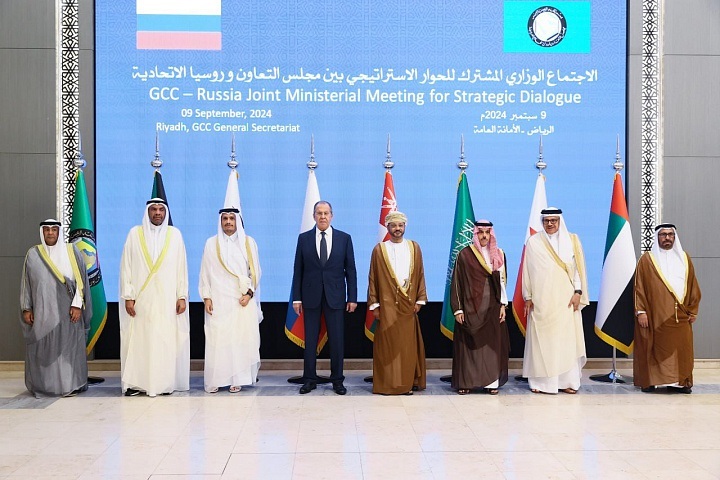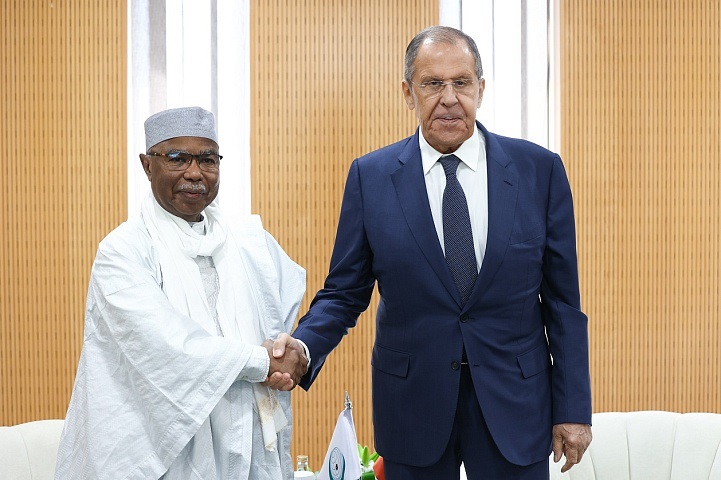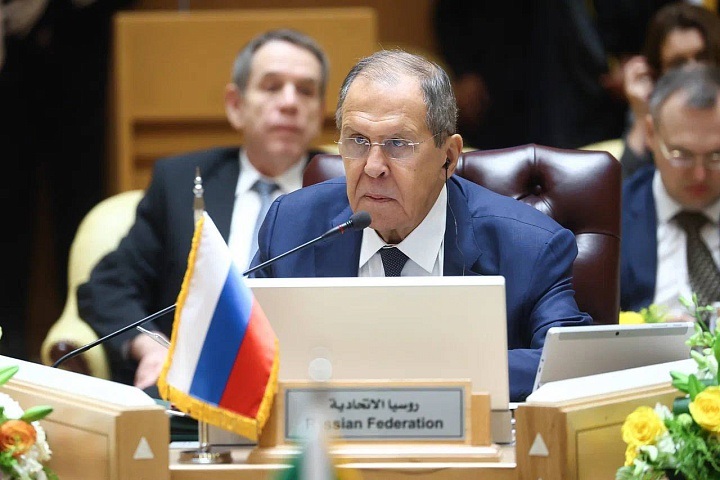 Photo: Russian MFA
Photo: Russian MFA
Foreign Minister Sergey Lavrov’s address at the 7th ministerial meeting of the Russia-Gulf Cooperation Council Strategic Dialogue, Riyadh, September 9, 2024:
Mr Chairman,
Mr Secretary General,
colleagues and friends.
I am glad to have the opportunity to be here on the hospitable Saudi land to hold the 7th ministerial meeting of the Russia-Gulf Cooperation Council Strategic Dialogue. As our chairman said we met in Moscow in 2023.
Riyadh, where the GCC is headquartered, is hosting our event for the third time. The strategic dialogue at the level of foreign ministers was launched 13 years ago. The world has changed a great deal since that time. We can state that the centuries-long hegemony of the West, which the United States and its allies are trying to preserve by all means, is going to be a thing of the past. The outlines of a new, more equitable multipolar international order are gradually emerging, which should be based on the principles of the UN Charter, balance of interests of all countries, both large and small, and also take into account the right of the peoples to determine their destiny by themselves. No doubt that the GCC is becoming a major independent centre in the developing multipolar international order.
The role of the Gulf Cooperation Council will be growing also because of the numerous crises still preserved in the Middle East. There are of conflicts here that pose threats to international peace and security and constrain opportunities for sustainable development in the countries of the region.
At the previous meeting in Moscow, we said that the achievement of genuine stability in the Middle East is impossible without settling the oldest regional problem – the Palestine-Israeli conflict through establishing a Palestinian state in compliance with UN resolutions. Unfortunately, time has once again confirmed that the region just cannot develop stably without resolving this problem.
Since October 2023 the confrontation is undergoing another dramatic escalation. And this time violence has reached unprecedented, really catastrophic dimensions. The number of victims among the peaceful population of the Gaza Strip has already exceeded the total number of the killed and wounded in all previous Arab-Israeli wars.
Together with our Arab friends, GCC countries inclusive, we have succeeded in securing, despite US resistance, the adoption of several Security Council and UN General Assembly resolutions demanding a ceasefire. Our Qatari friends, along with others, have played a key role in the indirect negotiation process between Israel and Hamas to resolve the situation in Gaza. Important decisions on the Palestinian issue were adopted at the end of the extraordinary LAS-OIC summit in Jeddah in November 2023 and the Arab summit meeting in Manama this past May.
Unfortunately, so far, we cannot bring the situation to normal. The inability of the world community to stop hostilities in Gaza and mass deaths of its population has led to a sharp deterioration of the military and political situation in the entire region – from the Lebanese-Israeli border area to the Red Sea.
The confrontation between Israel and Iran has reached a new dangerous level. The Middle East is again on the brink of a big regional war. To prevent it is our common responsibility. We are working on normalising the situation with all sides. We closely coordinate our actions in the United Nations and on other platforms with our friends from the Gulf Cooperation Council.
We expect that today we will be able to discuss these and other international issues on the agenda of our strategic dialogue.
Once again, I thank the presiding officers, the representative of Qatar and Saudi friends for an excellent organisation of our meeting.
 Photo: Russian MFA
Photo: Russian MFA
On September 9, Foreign Minister Sergey Lavrov met with Organisation for Islamic Cooperation Secretary-General Hissein Brahim Taha on the sidelines of the 7th Ministerial Meeting of the Strategic Dialogue Russia – Gulf Cooperation Council (photo).
During their conversation, the officials focused on the situation in the Palestinian-Israeli conflict zone. They called for ending hostilities in the Gaza Strip as soon as possible and launching serious talks to attain a comprehensive Middle East peace settlement in accordance with UN and UN Security Council resolutions.
They reaffirmed their mutual commitment to expanding and strengthening collaboration between Russia and the OIC in various fields still further.
 Photo: Russian MFA
Photo: Russian MFA
On September 9, Riyadh hosted the 7th Russia-Gulf Cooperation Council (GCC) Ministerial Meeting for Strategic Dialogue. The meeting was chaired by Foreign Minister Sergey Lavrov and Qatar’s Prime Minister and Minister of Foreign Affairs Mohammed Al Thani, representing the current GCC chair. The event was attended by the foreign ministers of the Kingdom of Bahrain, the State of Kuwait, the United Arab Emirates, the Kingdom of Saudi Arabia, and the Sultanate of Oman, as well as the Secretary General of the GCC, Russian MFA informs.
In his remarks, Sergey Lavrov highlighted that since the inception of the Russia-GCC Strategic Dialogue format in 2011, international relations have undergone significant changes, and global geopolitical transformations have taken place. The concept of a rules-based world order, which the United States and its European allies cling to, is increasingly becoming obsolete. Instead, a new, just, and democratic multipolar world order is emerging, centred around the United Nations and a balanced consideration of the interests of all countries. The influence of states in the Global South and East is rapidly expanding, with the rapidly evolving monarchies of the Arabian Peninsula playing a major role.
Sergey Lavrov emphasised that strengthening cooperation with our GCC partners is a key priority for Russian diplomacy. The Strategic Dialogue format has proven to be an effective mechanism for interaction, serving as a unique platform for aligning strategies and coordinating approaches to major global and regional issues. It also facilitates discussions on enhancing trade and economic relations, and cultural and humanitarian ties between our countries. This is evidenced by the frequent highest- and high-level interactions, with the positive tone being set by the regular and trusting dialogue between President Vladimir Putin and the leaders of the GCC member states.
The meeting participants thoroughly examined the situation in the Middle East and North Africa during the lively discussion. All participants agreed that the persistent problems and crises in the region should be addressed through political and diplomatic means, while strictly adhering to the core principles of the UN Charter.
The main focus was placed on discussing the crisis in the Palestine-Israeli conflict zone in the context of the unprecedented escalation of violence in the Gaza Strip. The participants also emphasised the importance of an immediate ceasefire in the Palestinian enclave and providing urgent humanitarian assistance to its residents. They also confirmed the need to consolidate international efforts to create conditions for launching a comprehensive peace process on a generally accepted international legal basis, providing for the creation of an independent Palestinian state coexisting with Israel in peace and security.
When discussing the developments in Yemen, the participants agreed that it is critical to ensure safe international shipping, stressing the need to address this task solely through political and diplomatic means. Hope was expressed that the parties to the Yemeni conflict will be able to avoid the resumption of the active phase of armed confrontation and begin implementing the UN roadmap for an internal political settlement.
When discussing the situation in Syria, the sides reaffirmed their commitment to the sovereignty, independence, unity and territorial integrity of this country. It was stressed that active efforts must be continued to help relieve the long-term crisis in the Syrian Arab Republic, including its post-conflict restoration and return of Syrian refugees. The importance of creating appropriate conditions for this purpose was noted, including lifting unilateral sanctions against Damascus, which was stated in the final document of the Arab League summit held on May 16 in Manama.
The developments in Sudan were discussed in detail, with an emphasis on the need to cease the armed confrontation and address pressing socioeconomic and humanitarian problems the country is facing.
In their remarks, Sergey Lavrov and his Arab counterparts reaffirmed mutual interest in further efforts to develop and diversify mutually beneficial business, cultural, and humanitarian ties, given the countries’ significant potential. In this context, the participants expressed their satisfaction with the successful implementation of the Russia-GCC Joint Action Plan for 2023-2028, which was approved at the sixth Strategic Dialogue meeting in Moscow in July 2023.
The parties agreed to hold the next, eighth meeting of the Russia-GCC Ministerial Meeting for Strategic Dialogue in the Russian Federation in 2025.
read more in our Telegram-channel https://t.me/The_International_Affairs

 12:32 10.09.2024 •
12:32 10.09.2024 •






















